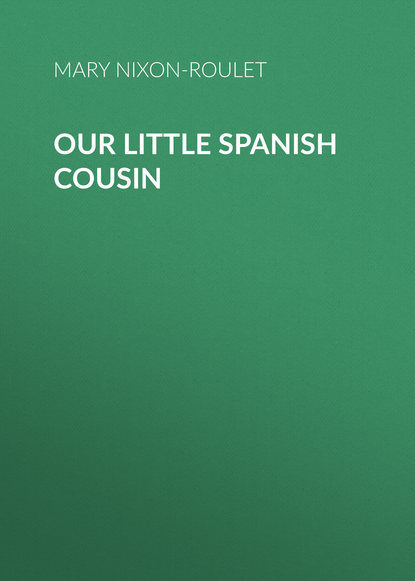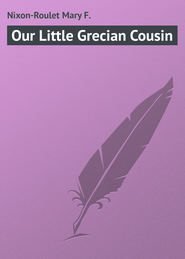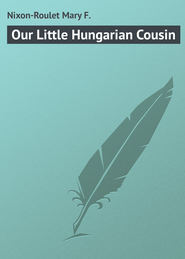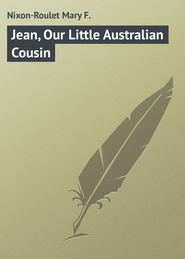По всем вопросам обращайтесь на: info@litportal.ru
(©) 2003-2024.
✖
Our Little Spanish Cousin
Настройки чтения
Размер шрифта
Высота строк
Поля
"How is the oil made?" asked Fernando.
"That is harder to do, but it is very interesting to watch. The fresh olives are carefully picked, dried a little, and then crushed. Old-fashioned stone mills are used to crush the fruit, and the mass is pressed to extract the liquid which contains all the watery juice as well as the oil and pulp."
"What do they do after it is pressed?" asked Fernando.
"They let it stand for a month and the refuse goes to the bottom. Then the oil is poured off and allowed to stand another month, when the process is repeated. After the third time the oil is ready for use. The best oil is made in this way, as it keeps its colour and flavour better by the settling process than when it is filtered.
"In some places the olives are placed on a platform and the millstone is placed over them. This is turned round and round by means of a pole to which a donkey is hitched, and the mass which is turned out is placed in rush baskets, which are put under a press which is screwed down by five or six men, so that the oil is squeezed out, but that is a very old-fashioned way of making oil, and there are better ways now. They still use this, however, when there is a big crop, and they want to get the fruit made into oil as rapidly as possible. Great care must be taken that everything is clean and that the oil does not become rancid, or it will all be spoiled."
"Is everything we eat so interesting?" asked Juanita.
"The things we eat and wear, too," her uncle answered, "and nothing in all Sevilla is more interesting than the way of making silk."
"How is that done?" asked Fernando.
"I am afraid I could not make you understand it all, unless you could go to the silk manufactory, and even then it would be hard for you. But I can tell you about the cocoons, and that is the strangest thing about it. The silkworm was first brought to Europe from India in 530, when monks brought it to the Emperor Justinian. The silkworm is a kind of a caterpillar which feeds on the leaves of the white mulberry-tree, and lays his eggs in a kind of gummy substance on the leaves in the end of June to be hatched out in the following April. The caterpillar is small at first, about a quarter of an inch long, but grows to be three inches in length. By means of a substance in their mouths the silkworms spin out silky strands which form cocoons, each fibre being about eight hundred yards long. When ready for weaving, the cocoons are placed in an oven at a gentle heat which kills the chrysalis so that the silk fibres can be removed and wound."
"How do they get the silk wound? Doesn't it break?" asked Fernando.
"It is rather hard to do," his uncle answered, "but they learn to be very careful, and the cocoon is soaked in warm water which loosens the little filaments. When the cocoons are reeled the first step has been taken, and the reeled silk is called raw silk, from which all silk products are made."
"I wish we could see it all, but perhaps we can sometime when we are here again," said Fernando. "Oh, it has stopped raining!"
"Yes, indeed, and the Guadalquiver has overflowed its banks," said Pablo, coming in at that moment. "There has not been such a freshet for years. Come along with me, Nando, and we will go boating in the streets. I climbed to the top of the Giralda, and the whole country looks like a great sea."
"Oh, may I go with Pablo and see?" cried Fernando, and his mother, with many injunctions to Pablo to take care of him, said "Yes."
They went to the Alcazar gardens, those most wonderful gardens of Spain, and as it was early spring the flowers and insects were making merry in the sunshine, which had come back with renewed force, after its vacation. Scarcely tumbled by the rain, lovely banksia roses were climbing over the walls, the rosy, blossoming judas-trees, tinted acacias, and pink almonds were in bloom, and orange-trees were bursting into fragrant beauty. Violets and tulips, yellow oxalis, wild hyacinths, and the scarlet dragon-flower carpeted the ground, while tall white lilies, like fair maidens, and stately iris with sword-like leaves, reminding one of the knights of chivalry who once walked these paths, stood sentinel adown the walks. Fernando saw, too, the insects which flitted among the branches, beetles with bright green coats like emeralds, white and gold butterflies, birds with brilliant wings and sweet voices. But Pablo was thinking more of sport than of nature, and he hurried along until they found a man and a boat to row them, and what a gay sail they had right down the main streets of the town! Past the cathedral steps and the Golden Tower where Columbus piled up gold brought from the New World, Sevillians say, and all the other interesting sights of the city, so that Fernando came home tired and happy, to tell Juanita of the wonderful things he had seen.
"I do not wonder that they say, 'He whom God loves has a house in Sevilla,'" he said. "It is so beautiful a city."
"Truly, —
"'Quien no ha vista Sevilla
No ha vista un maravillo.'"[11 - He who has not visited SevillaHas not seen a marvel.]
said Mariquita boastingly, but little Juanita prattled in reply the Grenadino's favourite response —
"'Quien no ha vista Grenada
No ha vista nada.'"[12 - Who has not seen GranadaHas seen nothing.]
CHAPTER IX.
TO THE COUNTRY
Home again! At first it seemed to Fernando as if he could never go back to school, for after his week of fêtes and processions and fun, lessons were dull things, but he soon fell into the old ways, and there were so many pleasant things at home that he did not pine for Sevilla at all.
He had a pet lamb – what boy has not in spring-time in Spain? – and he was devoted to it for awhile, trying to feed it all manner of things.
"Manuel," he said one day, "I do not know what is wrong with my pet lamb. It will not eat the things I give it. I have never seen so stubborn a thing. Mazo is far different. It will eat anything at all, but the lamb stands and stares at me, and shuts its mouth, no matter what I offer him."
"Lambs are always stubborn," said Manuel. "They do not eat much but milk when they are so young. But here, I have a new kite; will you fly it?"
"Indeed I will," cried the boy, and in an instant the lamb was forgotten, and he was skipping down the street, his kite skimming the air like a gaily coloured bird.
It was a beautiful spring in Granada, and Fernando spent every minute out of doors unless actually compelled to be in school or in bed. The family ate in the lovely patio where the flowers were beginning to blossom, and the sun was not too warm to do without the awning, which in summer stretched overhead. If it was not kites in which he was interested, it was marbles and ball, or even a play bull-fight; and Fernando was very proud when he was chosen to be "toro," and put his head in a basketwork affair with points like horns, and the boys chased him with sticks, running, jumping, and dodging when he turned and charged them as he had heard that the bulls did at the real corridos.
Best of all, it was time to have his head shaved, and of all things that was what he liked. His mother mourned, for the boy's hair was naturally curly, and in winter was as soft and pretty as black velvet. But all Spanish boys have their heads shaved in summer, and Fernando must be like the rest. It was cut so close that it made him look very funny, and his great black eyes shone like beads in his lean brown face, with no soft hair to soften its harsh outlines.
Fernando and Antonio were still devoted friends. They played together after school and on the holidays, and many delightful times did the two boys have, either in the Alhambra or at Fernando's home, where there were many city sights as interesting to Antonio as the delights of the old palace were to Fernando.
So devoted had they become that Fernando felt very sorry to leave his friend when the time came for him to accompany his mother and sister to their country home. Generally he had been delighted to go to the hacienda, and enjoyed the country school even more than the one he attended in the city, but this year he felt so badly over it that his father said:
"Never mind, my son. I shall bring Antonio out to visit you when school is over, and you may have a fine time together at the hacienda." This made Fernando more contented, and he went away with his parents quite happily.
As they started for the country on a bright May day, Juanita said, "Oh, mamma, see that strange cow! It is all dressed with flower-wreaths, and has bells around its neck and flowers on its horns. Why does that young girl lead it, and that old blind man walk behind, and blow that horn and beat the drum?"
"That is a cow to be won in a lottery," said the señora. "Manuel, stop; I wish to buy a ticket. How we Spaniards do love a game of chance! See, I shall buy a ticket for each one of you, and maybe your number will win the prize."
"Oh, thank you, mamma!" both children cried, for neither had ever had a lottery ticket before.
"Now I wish you to stop at a cigar-store, and buy a stamp[13 - In Spain stamps are sold in cigar-stores, not at the post-office.] for my letter to your Aunt Isabella, and then we will drive on."
As they turned into the main street leading to the Alameda, Juanita asked, "Oh, mi madre, what are those people sitting in the streets making?"
"Haven't you seen the ice-cream makers before?" said the señora. "No, I think you cannot remember last summer, can you? The gipsies go up to the Sierras in the very early morning, and get donkey-loads of snow, and the people make ice-cream in those pails with the snow in it. They sit right at their doors on the sidewalk and make the fresh cream, and any one can buy a glass of it."
"Do let us have some," cried the children, and their indulgent mother ordered the horses stopped while they ate some of the delicious fresh cream.
As the carriage rolled on down the steep street, so narrow that as Manuel said "one can hardly pass another after a full dinner," the swineherd was just coming out for the day, and Juanita cried:
"Oh, madre! See that man with the pipe in his mouth; what queer music he plays! What is he?"
"He is the swineherd, niña. See, he comes from his alley, staff in hand," the señora said. "Watch him blow his pipe without turning his head, and the pigs come after him, as if he had charmed them. Little and big, dark and light, fat and scrawny, there they come following him to pasture. Every alley we pass adds some curly tail to the procession. Now he is ready to turn out of the town into that grove, and see what an army of piggies follows him! He never looks for any of them, but they hear the music of his pipe and start because they learned long ago that it leads them to good pastures."
"I think they are too funny for anything," said the little girl. "Does he bring them back at night?"
"Yes, and every little piggy knows his own alley, and goes right home with a little frisk of his curly tail to say 'good night,'" said her mother, smiling.
"See those oxen; are they not splendid fellows? I love to see them draw their loads so easily. Beautiful creamy creatures, with their dark points and their great, soft eyes."
"What is that wooden thing over their heads?" asked Juanita.
"That is the yoke to couple them together. They are the gentlest animals in the world, these great, hornèd beasts, and the driver walks in front of them with a stick over his shoulder, which he seldom thinks of using."
"Oh, what a cunning little donkey!" cried the little girl, as they passed a tiny donkey laden with panniers filled with flowers, fruit, vegetables, bread, fowls, and even a water-jar. "How prettily he is clipped, all in a pattern."
"Mamma," said Fernando, "some of the donkeys that the gipsies have clipped have mottoes and pictures on them. I know a boy whose donkey has 'Viva mi Amo'[14 - I love my master.] on his side. I don't like that, for if the donkey doesn't love his master, it is telling a story."









